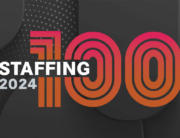What drives success and where do personal strengths fit in? Weighing in on the questions is renowned business consultant Marcus Buckingham, who has written bestsellers such as First, Break All the Rules and StandOut, which provides insights to managers on this and how to get the best from each member of their team. He has also worked with top companies such as Facebook, Toyota, Coca-Cola and Microsoft. Buckingham will share his insights on Feb. at the Staffing Industry Executive Forum in Phoenix. Senior Managing Editor Craig Johnson talks with Buckingham about the importance of team leaders, employee performance and engagement.
What is the biggest driver of performance and engagement at companies?
Marcus Buckingham: When it comes to performance, when it comes to engagement — the biggest driver of those things is the local team and the team leader. The biggest revolution in our space over the next five years is we are all going to realize you can’t do performance reviews from the center, you can’t do staffing from the center, you can’t do engagement from the center; that’s not where it happens. It happens in the team.
What can businesses do to identify team leaders?
On one level there are some pretty basic questions you can ask to see whether or not somebody is wired to be an effective team leader. The most obvious one is the simple, “would you rather do a job yourself or be responsible for having other people work?” We might think that changes over time, but actually it doesn’t. You’re obviously looking for people who say naturally that I’d rather be responsible for other people’s work.
There’s a delegation orientation that is a natural talent, it is not a skill. Then there’s an individualization that you need as a leader of a team. The best team leaders individualize and the best way to find out about that is to ask a question like this: “What is the best way to motivate somebody?” And you’ll hear a million different answers. But the best team leaders all say the same thing: It depends on the person, there’s no right answer, it depends.
A similar question is how closely should somebody be supervised? And, of course, the best ones who answer that question say the same thing: it depends on the person. Not how long they’ve been there. It just depends on who the person is.
So you can ask questions like those that enable you to see whether a person has a natural orientation to be a team leader.
Is there one characteristic across all industries that team leaders need?
Individualization. The ability to see and appreciate the fact that people are different. If you can’t do that you can’t play chess, and the best leaders play chess, not checkers. In chess, the pieces move in different ways, and in checkers all the pieces move in the same way.
What other specific requirements does a team leader need, particularly in staffing?
You need to understand which parts of a person are changeable and which parts are enduring. You need to understand that you cannot train everybody to be anything you want them to be. People do have consistent and recurring patterns of thought, feelings and behavior that make up who they are.
So when it comes to staffing you are trying to identify those things about a person that are transferrable from one situation to another. From outside the company to being inside the company, these are the things that a person brings with them. These are the not trainables. You’ve got to identify the things that you cannot train. I call it talent, you can also call them traits.
You should never select people on competencies, because competencies by definition are trainable. They are things you can learn how to do. And you need to make it very, very clear to yourself as a staffing leader what enduring parts of a person are you looking for and then you go and select for those. You don’t select on skills because you can train the skills. You select on talent and you’ve got to make it super clear to yourself what you’re selecting for, what kind of talent you are selecting for, ways of thinking, ways of reacting, ways of being motivated, selecting for those.
What are examples of traits that you cannot change?
You can’t train empathy, you can’t train competitiveness, you can’t train altruism, you can’t train strategic thinking, you can’t train focus, you can’t train positivity, you can’t train a need for achievement. None of those things you can train. We make a distinction between states and traits. A state is something you can change, it’s a state of mind. A person’s level of engagement with the company is a state, you can change it. A person’s mood is a state, you can change it. A person’s strategic thinking, or competition or empathy or focus or need for achievement, those are traits. Those endure. You can’t change those.
Share your thoughts on engaging employees at all levels, not just team leaders.
The simplest way to think about employee engagement is the fulfillment of two really distinct needs. The first is to make me feel part of something bigger than myself. And the second, make me feel special. If you like, it’s the distinction between “we” and “me.” You’ve got to make “me” feel part of a “we.”
For example, at Apple you say to your people, if you are excited by beauty, if your thing is beauty, vertically integrated hardware and software, come join us. Now if you are interested in speed and iteration and accidents and failing forward, don’t join Apple, join Facebook. It doesn’t really matter what your thing is. You had just better have a thing that says if you are into all this, come join us. Part of the engagement is that.
But the other part is pay attention to “me,” understand why I’m different from everybody else. Tell me how I can make a contribution. Pay attention to me. Pay attention to me.
There are two very different needs you’ve got to meet to engage people. And when you run the data on that, it’s pretty clear that people join for the “we” and they quit for “me.” You join because you believe that everybody believes what you believe and you feel safe and excited. And then you leave because you don’t feel as though someone understands you. And almost all of the ability to deliver on the “we” and the “me” happens in the team, not from the center.
In the end, it still comes down to hiring the right team leaders?
Yes. The most important decision a business owner ever makes on any subject is who do you make team leader?








A spot on article with excellent insight. I can speak first hand that allowing your team leaders to focus on their strengths and not working to improve their weaknesses will allow them to flourish and grow as leaders. I did not create this great team I am part of today. Yes I brought them together, but I then let them set their course. The team has morphed themselves into a cohesive, collaborative juggernaut and they’ve allowed me to come alone for the ride. The more they are challenged to “owe it”, the more success they demonstrate. Stand back and let your people do great things!
Rich Hutchings
Great article here. I am glad to see a piece on leadership because that separates the good from the great in this industry. It is all about engagement and hiring for talent. I was just having a conversation with my COO regarding our decision making process on talent being driven by core values. The talent you bring into and exit out of your organization will define your culture. You have to get it right. Thanks.
Gary Campbell